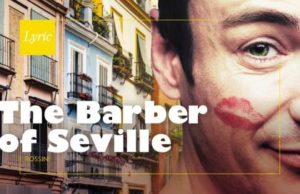
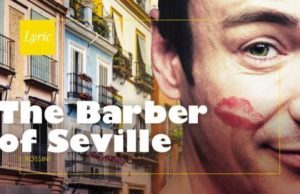 Highly Recommended ***** The audience laughed nonstop for an hour in the second half of The Barber of Seville, as ninety minutes of meticulous set-up broke into madcap comedy. That’s what happens in any successful production of the 1816 masterpiece by Gioachino Rossini, and the season premiere at the Lyric Opera was no exception. A remount directed by Tara Faircloth of the Rob Ashford production that played here five years, ago, Barber has lost none of its vitality, and is an ideal display of the physical comedy and vocal talents of its cast. It’s a rare work that can transcend centuries and cultures to remain genuinely funny, and under Sir Andrew Davis’s comfortable conducting, is a delight to the ear, as well.
Highly Recommended ***** The audience laughed nonstop for an hour in the second half of The Barber of Seville, as ninety minutes of meticulous set-up broke into madcap comedy. That’s what happens in any successful production of the 1816 masterpiece by Gioachino Rossini, and the season premiere at the Lyric Opera was no exception. A remount directed by Tara Faircloth of the Rob Ashford production that played here five years, ago, Barber has lost none of its vitality, and is an ideal display of the physical comedy and vocal talents of its cast. It’s a rare work that can transcend centuries and cultures to remain genuinely funny, and under Sir Andrew Davis’s comfortable conducting, is a delight to the ear, as well.
The story, adapted from Pierre Beaumarchais by Cesare Strebini, concerns Count Almaviva (Lawrence Brownlee) as he attempts to win the hand of Rosina (Marianne Crebassa). Although she returns his affection while he is disguised as a simple musician, she is under the domain of her greedy guardian, Dr. Bartolo (Alessandro Corbelli). He intends to marry her in order to seize her dowry; it’s up to the barber and fixer, Figaro (Adam Plachetka), to save the day through cunning disguises and misdirection.
Many of these names will be familiar to Lyric fans. Brownlee and Corbelli played very similar roles in the raucous recent production of Rossini’s Cinderella, which was also conducted by Sir Davis. If anything, this witty production gives them even greater license to cut loose. The tenor Brownlee is a master of coloratura, which he uses to give a rock musician’s pizzazz to the count’s opening aria, “Ecco, ridente in cielo.” But Ashford’s staging also makes hilarious use of his diminutive stature, which works amazingly as a character trait for the haughty count. Baritone Corbelli’s Dr. Bartolo is a crass old villain who hardly bothers to make any pretense of loving Rosina; he barks his lines in her face and is reduced to sputtering incoherence while upbraiding her. As for Marianne Crebassa’s Rosina, she’s winsome with giddy excitement during her cavatina, “Una voce poco fa,” in which she looks forward to doing some mischief of her own. Notably, Rosina is as active as presence in this staging to explain why the iconic overture is used as her theme music, more than the titular Figaro’s, although he’s no slouch when it comes to lighting-fast improvisation, either.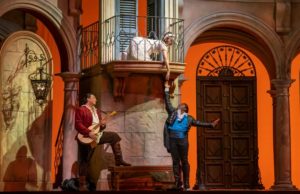
Figaro, played by the vivacious and charming bass-baritone Plachetka, finds his sinister inverse in the parasitic Don Basilio (Krzystof Bączyk). While Figaro plops himself down centerstage and basks in the adoration of his admirers as he introduces himself as Seville’s great factotum, gaunt Don Basilio slithers around slashing at the stage with claw-like fingers. A newcomer to the Lyric stage, bass Bączyk is simultaneously alluring and repellent during his show-stopping hymn to slander, “La calunnia.” This is also a moment when Sir Davis gets to unleash the energy and agility of the Lyric’s orchestra, and a much-anticipated highlight of the evening. (Plachetka and Bączyk are also both required to perform tongue-twisters in a foreign-language during these sections, which is a thrill in itself.)
As far as staging, Ashford and Faircloth have a knack for finding just plausible enough business to create a laugh-a-minute farce. Set designer Scott Pask doesn’t get in their way, being content to provide a taste of Andalusia, and lighting designer Howard Harrison mostly sticks with evocative blues and purples appropriate for love themes. Funny as the lyrics are, the music is complex enough to demand a certain level of dramatic seriousness, which each cast member is experienced enough to find the right balance for. After all, three people singing about how they’re going to escape down the balcony any minute now wouldn’t be funny if there weren’t a little urgency to it, and Brownlee’s coloratura nicely accents his denunciation of the cruel Bartolo during the show’s final minutes. The Barber of Seville contains some of the best-known classical compositions, and it had many audience members bobbing along from the first notes. That energy never flagged; and by the end, it resounded like Don Basilio’s cannon.
Il barbiere di Siviglia (The Barber of Seville) will continue at the Lyric Opera House, 20 N Upper Wacker Drive, Chicago, thru October 27, with the following showtimes:
October 5: 7:30 pm
October 10: 2:00 pm
October 13: 2:00 pm
October 18: 7:00 pm
October 21: 7:00 pm
October 27: 2:00 pm
Running time is three hours and five minutes with one half-hour intermission.
Performances are in Italian with English supertitles.
The Lyric offers parking deals with Poetry Garage at 201 W Madison St. if inquired about in advance. Tickets start at $49; to order, visit LyricOpera.org or call 321-827-5600.
To see what others are saying, visit www.theatreinchicago.com, go to Review Round-Up and click at “The Barber of Seville.”

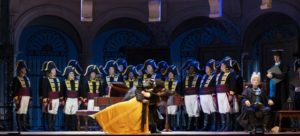
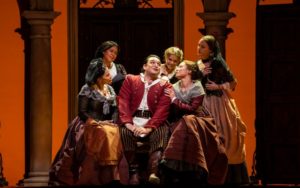


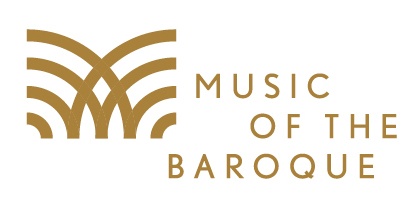

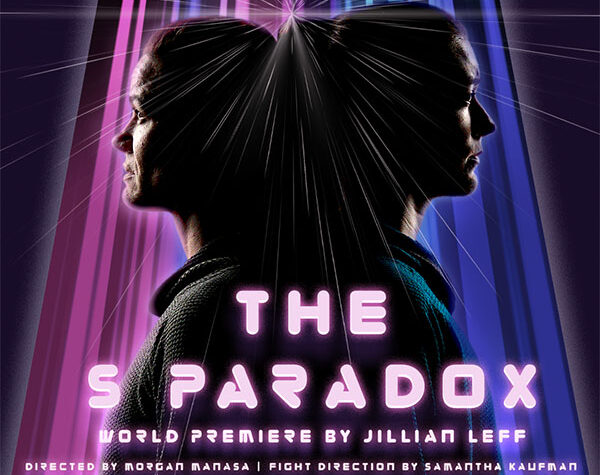
More Stories
“The Music Man”
“The S Paradox” reviewed by Julia W. Rath
“A Year With Frog and Toad”